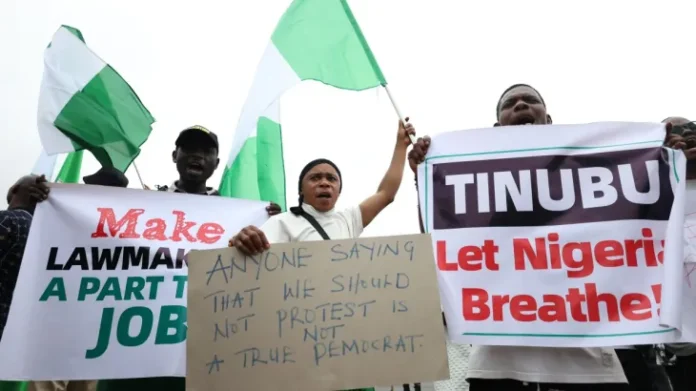By: Daure David
The Security measures in Lagos have been significantly heightened as the nation braces for a nationwide protest scheduled for April 7, spearheaded by the Take-It-Back movement and a coalition of civil society organizations. The protest is aimed at drawing attention to the soaring cost of living, claims of bad governance, and the growing suppression of free speech under President Bola Tinubu’s administration.
Protest organizers are calling for the immediate repeal of the controversial Cybercrime Act, which they claim has been used to stifle free expression, as well as the lifting of an “emergency rule” in Rivers State, which they argue undermines democratic institutions. With accusations that the government is eroding Nigeria’s democratic structures, the protests are set to bring together a broad range of citizens frustrated by the current political climate.
Security and Logistics in High Alert
Ahead of the protests, authorities have stepped up security measures in Lagos, Nigeria’s commercial capital, deploying additional police forces to strategic locations across the city. Roadblocks and heightened surveillance are expected in key areas, particularly around government buildings and prominent public spaces where demonstrators are expected to converge.
While organizers maintain that the protest will remain peaceful, fears of violence and unrest have been raised, particularly after recent clashes between security forces and protesters in other parts of the country. Proponents of the protest emphasize that they are seeking to express their frustrations through peaceful means, but also warn that the failure of the government to address their demands may lead to heightened tensions.
The Issues at the Heart of the Protest
Central to the grievances are claims of worsening economic conditions. Protesters argue that living expenses, including food prices, fuel costs, and utilities, have skyrocketed, making life increasingly difficult for ordinary Nigerians. Many blame the current administration’s policies for exacerbating economic challenges, including the controversial removal of fuel subsidies, which have led to significant price hikes.
The protest also revolves around accusations of political repression, particularly in Rivers State, where an “emergency rule” has been imposed. Activists contend that the rule is an attempt to silence political opposition and undermine democratic processes. This, they say, is part of a broader trend under President Tinubu’s leadership, where democratic norms appear to be under siege, with key state institutions, including the judiciary and the legislature, allegedly being suspended or sidelined in politically motivated moves.
The Cybercrime Act, passed in 2015, has come under renewed scrutiny for its perceived role in curbing freedom of speech. Critics argue that the law is overly broad and has been used to target journalists, activists, and ordinary citizens for expressing dissenting opinions online. Protesters are demanding that the Act be repealed, citing it as a tool of government overreach.
Rising Discontent Among Nigerians
This protest comes at a time of growing dissatisfaction with the government. Since President Tinubu’s election, there have been increasing concerns over what many describe as a tightening grip on political freedoms and human rights. While the government has defended its policies, arguing that reforms are necessary to stabilize Nigeria’s economy and strengthen its security, many Nigerians remain unconvinced, feeling that their voices are being stifled.
The Take-It-Back movement, which has led similar protests in the past, is framing this action as a pivotal moment for the future of democracy in Nigeria. According to movement spokespersons, the goal is to send a strong message to the government that Nigerians will not stand idly by while their rights are trampled upon.
Possible Outcomes and Global Implications
As the protest approaches, there are questions about what will happen next. If the protests remain peaceful, it could serve as a significant display of public dissatisfaction and a reminder of the power of civil society in holding the government accountable. However, if violence breaks out or the protests turn confrontational, it could result in a severe crackdown by security forces, leading to a potential escalation in tensions.
International observers are closely monitoring the situation, with some expressing concern over the potential for human rights violations. Several international human rights organizations have already issued statements calling for the protection of peaceful protesters and urging the government to respect the fundamental right to free expression.
The outcome of this protest may set the tone for the future of political engagement in Nigeria. If the protesters succeed in rallying enough support, they could force the government to reconsider its policies or approach to governance. Conversely, if the protest is met with heavy-handed repression, it could further alienate the public, sparking more widespread discontent.
As Nigerians prepare to take to the streets on April 7, the question remains: Will the government listen to the demands of its citizens, or will the protest mark a pivotal moment in the ongoing struggle for democracy in the country?







